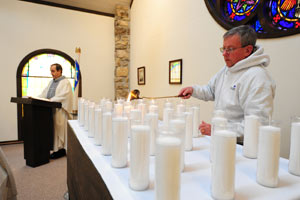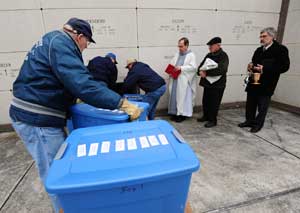 Fr. Carl Schmitt, pastor of Corpus Christi Parish in Sturgeon Bay, reads the names of the deceased whose cremated remains went unclaimed while cemetery sexton Bob Spude lights candles for each one during a Nov. 18 service in the chapel at St. Joseph Cemetery in Sturgeon Bay. After the service the cremains of 33 people, one of whom was unidentified, were entombed in the cemetery’s mausoleum. (CNS photo/Sam Lucero, The Compass)STURGEON BAY –– The prayers recited Nov. 18 at St. Joseph Cemetery were identical to any other Catholic funeral rite. But this service, led by Father Carl Schmitt, pastor of Corpus Christi Parish, was different.
Fr. Carl Schmitt, pastor of Corpus Christi Parish in Sturgeon Bay, reads the names of the deceased whose cremated remains went unclaimed while cemetery sexton Bob Spude lights candles for each one during a Nov. 18 service in the chapel at St. Joseph Cemetery in Sturgeon Bay. After the service the cremains of 33 people, one of whom was unidentified, were entombed in the cemetery’s mausoleum. (CNS photo/Sam Lucero, The Compass)STURGEON BAY –– The prayers recited Nov. 18 at St. Joseph Cemetery were identical to any other Catholic funeral rite. But this service, led by Father Carl Schmitt, pastor of Corpus Christi Parish, was different.
The funeral service was for the unclaimed cremains of 33 people, donated to St. Joseph Cemetery by Huehns Funeral Home and Forbes Funeral Home of Sturgeon Bay. Many of the remains had been at the funeral homes for decades, said the spokesmen at the homes.
“A lot (of the cremains) were just unclaimed and for a number of reasons,” said Father Schmitt following the service. “The funeral homes did their diligence in trying to find family members first.”
As the priest said during the service, no one in attendance knew who the deceased were but everyone understood it was a way to “give them back to God.”
Related story:Archdioceses clarify church teaching on cremation, burial of remains |
According to Todd Huehns of Huehns Funeral Home, giving the cremated remains a dignified resting place was the main reason he contacted St. Joseph Cemetery earlier this year. All but one of the cremains were identified, and after unsuccessful attempts at uniting them with families, the funeral homes decided to approach the Catholic cemetery.
“Once (efforts to find relatives were) exhausted, we contacted Father Carl and asked if we could proceed” with interment at the cemetery, Huehns told The Compass, newspaper of the Diocese of Green Bay. “Father Carl said he would take care of contacting the cemetery board and find out if they could help. They provided at no cost the space in the mausoleum and said it was all part of their ministry for these souls; that they needed to be somewhere.”
The St. Joseph Cemetery board and the cemetery sextons proposed that the cremains be interred in one crypt in the mausoleum. “It was a big effort between the funeral homes, St. Joseph Cemetery Board and the sextons,” said Father Schmitt. “I offered to be part of it, which was a privilege and an honor.”
Father Schmitt said he was adamant that if families in the future came to claim cremains they would be able to do so. That is why all the cremains were placed in one crypt, he said.
 Sextons transfer the unclaimed cremains of 33 people into the mausoleum crypt Nov. 18 at St. Joseph Cemetery in Sturgeon Bay. Affixed to the top of each container are the names of 32 of the deceased. One was unidentified. (CNS photo/Sam Lucero, The Compass)“If I was a person who was away from my parents and found they had died, I would want a paper trail to find them,” he said. “They would be able to go to the city hall and find a death certificate. With that, they would find the funeral home” and receive information on the unclaimed cremains.
Sextons transfer the unclaimed cremains of 33 people into the mausoleum crypt Nov. 18 at St. Joseph Cemetery in Sturgeon Bay. Affixed to the top of each container are the names of 32 of the deceased. One was unidentified. (CNS photo/Sam Lucero, The Compass)“If I was a person who was away from my parents and found they had died, I would want a paper trail to find them,” he said. “They would be able to go to the city hall and find a death certificate. With that, they would find the funeral home” and receive information on the unclaimed cremains.
They chose to have the service in November “because that’s the month we remember souls,” added Father Schmitt, who invited other Christian clergy to attend. The cremains were placed inside four blue plastic containers. Names of the deceased were written on paper and taped to the top of the container in which they were placed.
The containers rested on a sheet of plywood fastened to a casket cart. They were covered with a pall and sat in front of the chapel altar. Before the funeral service began, 33 candles, representing each deceased person, were placed on the altar.
After welcoming guests, Father Schmitt read the names of the deceased while cemetery sexton Bob Spude lit the candles. Father Schmitt then used holy water to bless the containers and the Rev. Joe Mitchell of United Methodist Church of Sturgeon Bay and Jacksonport read a Scripture passage.
Following the day’s Gospel reading, Father Schmitt said the service was different than any other because no one present knew the deceased. “All we know is that they were born Christian and we know we are giving them back to God,” he said. He then played an Irish hymn on a CD player and asked the group to “pray for each of these 33 souls, for the grace of God to be upon them.”
The chapel service ended with Father Schmitt using a censor to bless the containers with incense. A procession then followed from the chapel to the cemetery mausoleum, where the four containers were transferred into the crypt.
After the service, Father Schmitt explained why the funeral rite was important.
“Our life here on earth is precious and sacred and it’s important that we have a sacred final place of rest,” he said. “It wasn’t an option, in my opinion, to keep them on a shelf somewhere else.”
